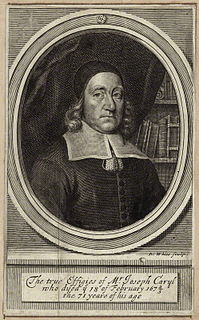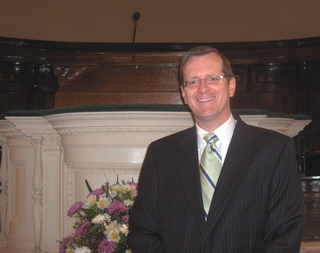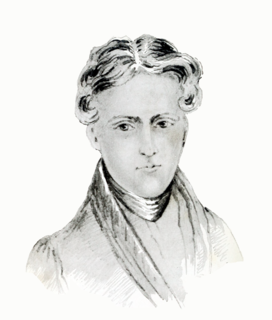A Quote by Neale Donald Walsch
And a true God is not One with the most servants, but One who serves the most, thereby making Gods of all others. For this is both the goal and the glory of God: that His subjects shall be no more, and that all shall know God not as the unattainable, but as the unavoidable.
Related Quotes
God takes the most eminent and choicest of His servants for the choicest and most eminent afflictions. They who have received most grace from God are able to bear most afflictions from God. Affliction does not hit the saint by chance, but by direction. God does not draw His bow at a venture. Every one of His arrows goes upon a special errand and touches no breast but his against whom it is sent. It is not only the grace, but the glory of a believer when we can stand and take affliction quietly
For worship is, essentially, the reverse of sin. Sin began (and begins) when we succumb to the temptation, "You shall be as gods." We make ourselves the center of the universe and dethrone God. By contrast, worship is giving God his true worth; it is acknowledging Him to be the Lord of all things, and the Lord of everything in our lives. He is, indeed, the Most High God!
For the next fifty years this alone shall be our keynote - this, our great Mother India. Let all other vain gods disappear for the time from our minds. This is the only god that is awake, our own race - "everywhere his hands, everywhere his feet, everywhere his ears, he covers everything." All other gods are sleeping. What vain gods shall we go after and yet cannot worship the god that we see all round us, the Virât? When we have worshiped this, we shall be able to worship all other gods.
It is when we create things for God's sake that our work most clearly promotes His glory, rather than threatening to compete with it. Thus the true purpose of art is the same as the true purpose of anything: it is not for ourselves or for our own self-expression, but for the service of others and the glory of God.
I am persuaded that I shall obtain the highest amount of present happiness, I shall do most for God’s glory and the good of man, and I shall have the fullest reward in eternity, but maintaining a conscience always washed in Christ’s blood, by being filled with the Holy Spirit at all times, and by attaining the most entire likeness to Christ in mind, will, and heart, that it is possible for a redeemed sinner to attain to in this world.
Remember the words of Christ: "Ask, and it shall be given you; seek, and ye shall find; knock, and it shall be opened unto you." These words are literally true, not figures or fiction. They were the outflow of the heart's blood of one of the greatest sons of God who have ever come to this world of ours; words which came as the fruit of realisation, from a man who had felt and realised God himself; who had spoken with God, lived with God, a hundred times more intensely than you or I see this building.
In scripture we are told of some trusting in God and others trusting in idols, and that God is our refuge, our strength, our defense. In this sense God is the rock of his people, and false Gods are called the rock of those that trust in them. In the same sense the Gods of the King who shall do according to his will are called Mahuzzims, munitions, fortresses, protectors, guardians, or defenders.
There are two gods. The god our teachers teach us about, and the God who teaches us. The god about whom people usually talk, and the God who talks to us. The god we learn to fear, and the God who speaks to us of mercy. The god who is somewhere up on high, and the God who is here in our daily lives. The god who demands punishment, and the God who forgives us our trespasses. The god who threatens us with the torments of Hell, and the God who shows us the true path.
There are two gods. A god who casts us off because of our sins, and a God who calls to us with His love.
God felt, God tasted and enjoyed is indeed God, but God with those gifts which flatter the soul, God in darkness, in privation, in forsakenness, in sensibility, is so much God, that he is so to speak God bare and alone. Shall we fear this death, which is to produce in us the true divine life of grace?
It is not a terrible thing to a wretched soul, when it shall lie roaring perpetually in the flames of hell, and the God of mercy himself shall laugh at them; when...God shall mock them instead of relieving them; when none in heaven or earth can help them but God, and he shall rejoice over them in their calamity
'Now we are the sons of God'. This is the starting point of adoption. However, 'it does not yet appear what we shall be: but we know that, when He shall appear, we shall be like Him; for we shall see Him as He is' (I Jn. 3:2). This is the perfection of adoption of sons and renewal which God bestowed on us in Christ, and of which John says in his Gospel that, 'Christ gave power to become the sons of God, even to them that believe on His name: which were born, not of blood, nor of the will of the flesh nor of the will of man, but of God' (Jn. 1:12-13).
Get rid of the idea that God wants you to sacrifice yourself for others, and that you can secure his favor by doing so; God requires nothing of the kind from you. What He wants is that you should make the most of yourself, for yourself, and for others; and you can help others more by making the most of yourself than in any other way.


































